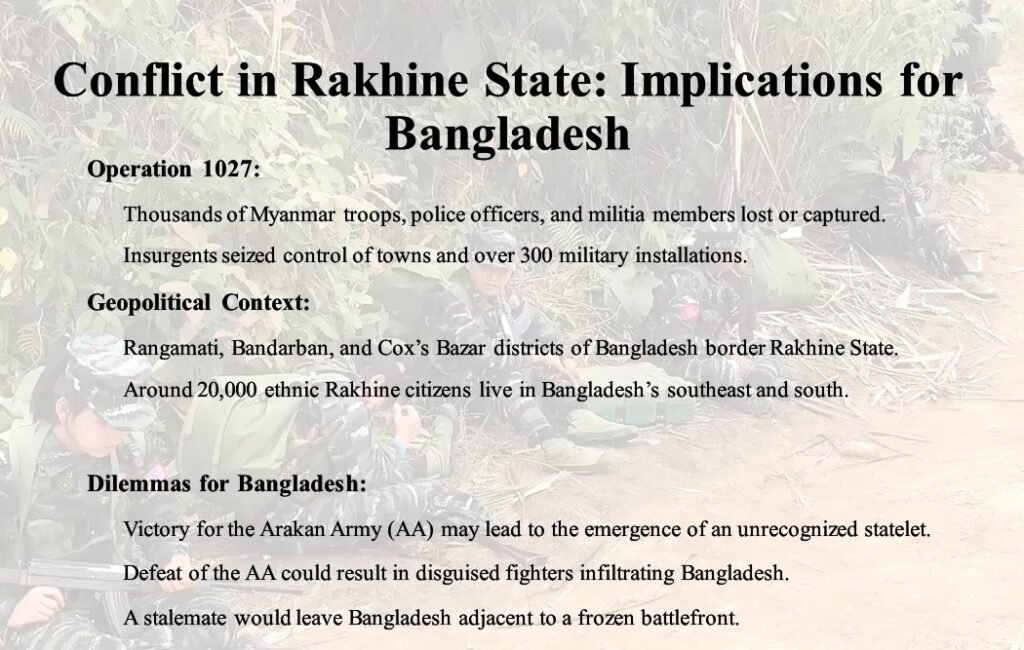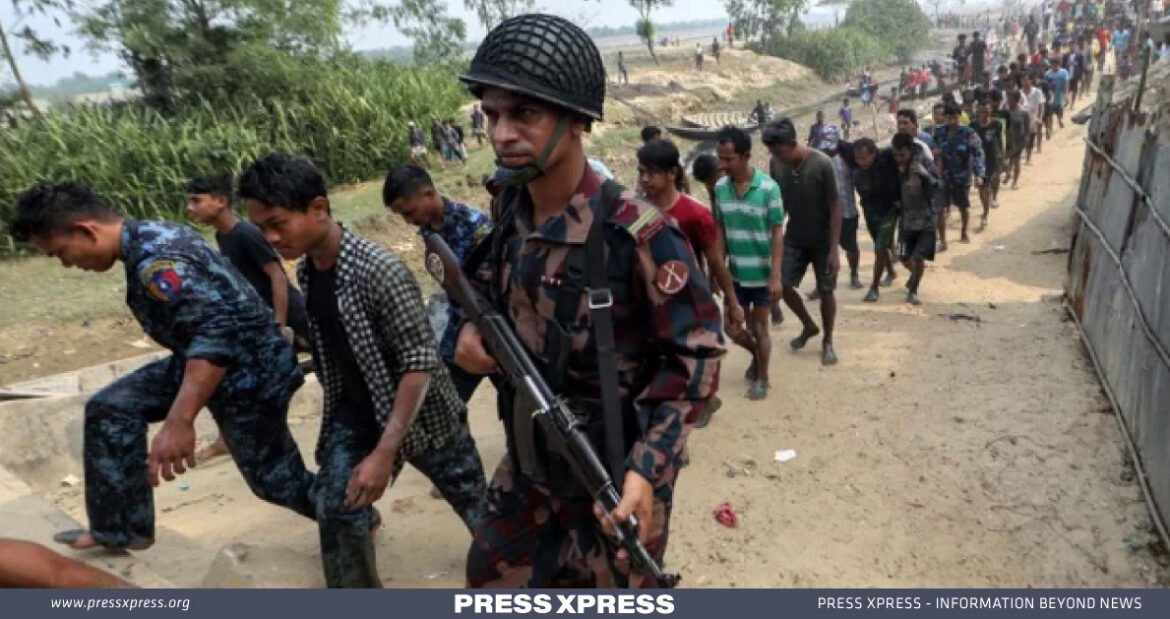Key Highlights:
- Four mortar shells struck a hill check post in Rakhine, near Jamchari village in Naikhongchhari Sadar
- In Balukhali, Teknaf’s Whykong union, locals woke to continuous gunfire and intermittent explosions from across the Myanmar border on Tuesday morning, February 13th
- 20,000 ethnic Rakhine citizens reside in Bangladesh’s southeastern and southern regions
Following recent unrest, a temporary ceasefire between Myanmar military forces and armed insurgents has brought a semblance of peace to the border region between Bandarban and Cox’s Bazar. Residents who fled their homes are now beginning to return, but concerns about their safety persist.
Gunshots and mortar explosions resumed across bordering regions on Sunday, February 25th, instilling panic among locals. The clashes began in late October 2023 when ethnic rebel groups launched a coordinated offensive against Myanmar junta forces.
According to sources, the clash between Border Guard Police and the Myanmar insurgent group Arakan Army intensified since February 2nd, 2024. Residents and local authorities reported heavy shelling in Rakhine on Sunday, causing fear among half a million people residing on the Ukhia-Teknaf border.
Earlier incidents include fatalities and injuries due to mortar shell explosions and firings across the border. Uncertainty looms throughout the conflict, leaving residents gripped by fear and enduring sleepless nights.

Past Instances of Gunshots Ringing Out from Myanmar
After a period of uneasy calm in recent days, the people of Balukhali in Teknaf’s Whykong union woke to the sounds of continuous gunfire and intermittent explosions from across the Myanmar border on Tuesday, February 13th morning. According to locals, the sounds of firing persisted between 8 a.m. and 11 a.m.
Locals mentioned that while sporadic firing across the border had been heard over the past four or five days, the continuous gunshots experienced on Tuesday morning were unprecedented. They also claim that the Arakan Army has already taken control of the area on the Myanmar side opposite this border. Unable to withstand the Arakan Army’s assault, Myanmar’s border guards fled to Bangladesh.
At least 330 members of the Myanmar army, border guards, police, immigration officials, and other personnel sought refuge in Bangladesh, subsequently placed under the supervision of the BGB.
Intensified Patrols on Naf River Front
Amidst the continuing conflict, Bangladesh’s Border Guard (BGB) has strengthened security measures. Enhanced patrols by both the Border Guard Bangladesh (BGB) and the Bangladesh Coast Guard (BCG) now sweep the Naf River vicinity to thwart infiltration attempts.
Furthermore, routine patrols have been augmented, with the deployment of four specialized teams on land tasked with preventing unauthorized border crossings.
The Domino Effect of Operation 1027
Since October 27, 2023, Rakhine State has been engulfed in intense conflict between the Myanmar Armed Forces and ethnic Rakhine insurgents, as part of the broader Operation 1027.
Operation 1027 has already seen the loss or capture of thousands of Myanmar troops, police officers, and militia members, with insurgents seizing control of numerous towns and over 300 military installations across the nation, including vital border crossings with China.
Three districts of Bangladesh – Rangamati, Bandarban, and Cox’s Bazar – directly border Rakhine State, while approximately 20,000 ethnic Rakhine citizens reside in Bangladesh’s southeastern and southern regions.
The potential outcomes of the conflict pose complex dilemmas for Bangladesh: should the AA emerge victorious, Bangladesh would border an unrecognized statelet; if the AA is defeated, Bangladesh may face an influx of disguised AA fighters infiltrating its territory; and in the event of a stalemate, Bangladesh would be adjacent to a frozen battlefront.
Furthermore, the conflict’s escalation is likely to exacerbate the flow of illicit drugs and weapons into Bangladesh. Hence, the escalation of the conflict in Rakhine State presents Bangladesh with a formidable challenge.

To sum up, the conflict in Rakhine State persists as a looming threat over the border regions of Bangladesh, profoundly affecting the lives of local inhabitants caught amidst the turmoil. Although a temporary ceasefire provided a momentary relief, recent episodes of gunfire and mortar blasts underscore the volatile environment. The lingering uncertainty regarding the conflict’s duration only deepens the apprehension among border communities. Bangladesh maintains heightened vigilance, strengthening patrols along the Naf River and implementing stringent security protocols to thwart any infiltration efforts.


